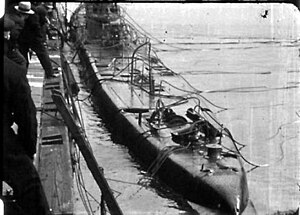 Lancetfish (SS-296) is finally on a level keel on March 23, 1945, eight days following her accidental sinking at Pier 8 East of the Boston Navy Yard. She would be decommissioned the following day, 24 March.
| |
| History | |
|---|---|
| Builder | William Cramp & Sons, Philadelphia[1] |
| Yard number | 551 |
| Laid down | 30 September 1942[1] |
| Launched | 15 August 1943[1] |
| Commissioned | 12 February 1945[1] |
| Decommissioned | 24 March 1945[1] |
| Stricken | 9 June 1958[1] |
| Fate | Sold for scrap, 20 August 1959[1] |
| General characteristics | |
| Class and type | Balao-class diesel-electric submarine[2] |
| Displacement | |
| Length | 311 ft 8 in (95.00 m)[2] |
| Beam | 27 ft 3 in (8.31 m) [2] |
| Draft | 16 ft 10 in (5.13 m) maximum[2] |
| Propulsion |
|
| Speed | |
| Range | 11,000 nm (20,000 km) surfaced at 10 knots (19 km/h)[6] |
| Endurance |
|
| Test depth | 400 ft (120 m)[6] |
| Complement | 10 officers, 70–71 enlisted[6] |
| Armament |
|
USS Lancetfish (SS-296), a Balao-class submarine, was the only ship of the United States Navy to be named for the lancetfish (Alepisaurus ferox), a large voracious, deep sea fish having long lancetlike teeth and a high long dorsal fin.
Her keel was laid down on 30 September 1942 by Cramp Shipbuilding Company of Philadelphia. She was launched on 15 August 1943 sponsored by Miss Beatrice P. Barker, towed to Boston Navy Yard 19 May 1944 for completion, and commissioned 12 February 1945.

While tied up alongside Pier 8, Lancetfish flooded through an aft torpedo tube and sank 15 March 1945. She was raised eight days later and decommissioned 24 March. Assigned to the Atlantic Reserve Fleet in uncompleted condition, she was transferred to the First Naval District 27 February 1947 and was assigned to the New London Group 9 December 1952. She was struck from the Naval Vessel Register on 9 June 1958 and sold for scrap for $57,189 on 20 August 1959 having never gone to sea on patrol, to Yale Waste Company, Boston, Massachusetts.
Although Lancetfish was commissioned at the time of her sinking, she never saw active service, and she is not counted among the 52 American submarines lost during World War II.
- ^ a b c d e f g Friedman, Norman (1995). U.S. Submarines Through 1945: An Illustrated Design History. Annapolis, Maryland: United States Naval Institute. pp. 285–304. ISBN 1-55750-263-3.
- ^ a b c d e f Bauer, K. Jack; Roberts, Stephen S. (1991). Register of Ships of the U.S. Navy, 1775–1990: Major Combatants. Westport, Connecticut: Greenwood Press. pp. 275–280. ISBN 0-313-26202-0.
- ^ a b c d e Bauer, K. Jack; Roberts, Stephen S. (1991). Register of Ships of the U.S. Navy, 1775–1990: Major Combatants. Westport, Connecticut: Greenwood Press. pp. 271–280. ISBN 978-0-313-26202-9.
- ^ U.S. Submarines Through 1945 pp. 261–263
- ^ U.S. Submarines Through 1945 pp. 305–311
- ^ a b c d e f U.S. Submarines Through 1945 pp. 305–311